Oyster mushrooms are considered one of the most nutritionally dense food items on the planet, offering up an assortment of vitamins and minerals to your body as well as some truly remarkable nutrients you might not be familiar with.
They’re extremely popular in Asia and becoming more common in North America as well, thanks to the many health benefits of eating oyster mushrooms regularly. While they’re often used as an ingredient in soups or stews or other dishes, you can also eat them by themselves - especially if you’re looking to improve your health in some key ways.
We’ll explore everything about oyster mushrooms and 8 fascinating health benefits will have you running to the store to start adding these fungi to your diet.
What are oyster mushrooms?
Oyster mushrooms, also known as Pleurotus ostreatus or hiratake, are a gourmet mushroom with more than 40 edible species. The visually appealing oyster mushroom is a common type of cultivated mushroom that got its name from a look-alike mollusk. You’ve likely seen them in stores with their wavy caps, and may have had them in stir-frys, soups, or sautés.
Oyster mushrooms grow in temperate and subtropical forests and are typically found on rotting wood and trees. But you can also grow them in your kitchen with popular grow kits!
Deciding which oyster mushroom is right for you involves a lot of factors. Let’s dive into some of the common varieties.
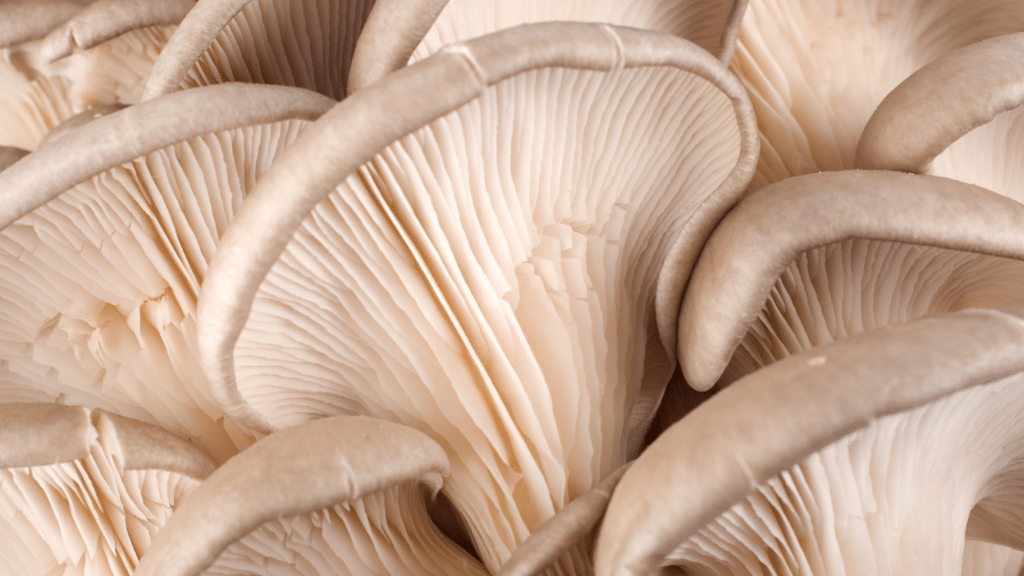
Common types of oyster mushrooms
All oysters contain gills under their caps, so there’s one broad way to distinguish them.
Since there are 40 types of oyster mushrooms, we won’t cover them all here. But here are some notable ones that stand out due to their flavor or appearance.
- Pearl oyster: Pearl oysters grow in clusters and are cultivated around the world for its great taste.
- Blue oyster: The blue oyster mushroom has a nice, meaty texture and is known for being easy and fast to grow by mushroom cultivators.
- Golden oyster: A gorgeous display of petal-like yellow caps, the golden oyster is known for its signature nutty flavor when cooked.
- Pink oyster: The pink oyster has a shorter shelf life, so that’s why they’re more uncommon in grocery stores despite their lovely appearance.
- King oyster: The king oyster is dense and chewy, making for a great meat substitute. The best part about king oysters? You can also eat their stems.
- Elm oyster: Elm mushrooms usually grow high up in trees, which makes them less common in foraging.
- Phoenix oyster: Phoenix mushrooms give off a slightly sweet flavor and can in part be identified by their closely packed gills under the cap.
While all oyster mushroom species differ in texture, flavor, and availability, they typically have similar nutritional value.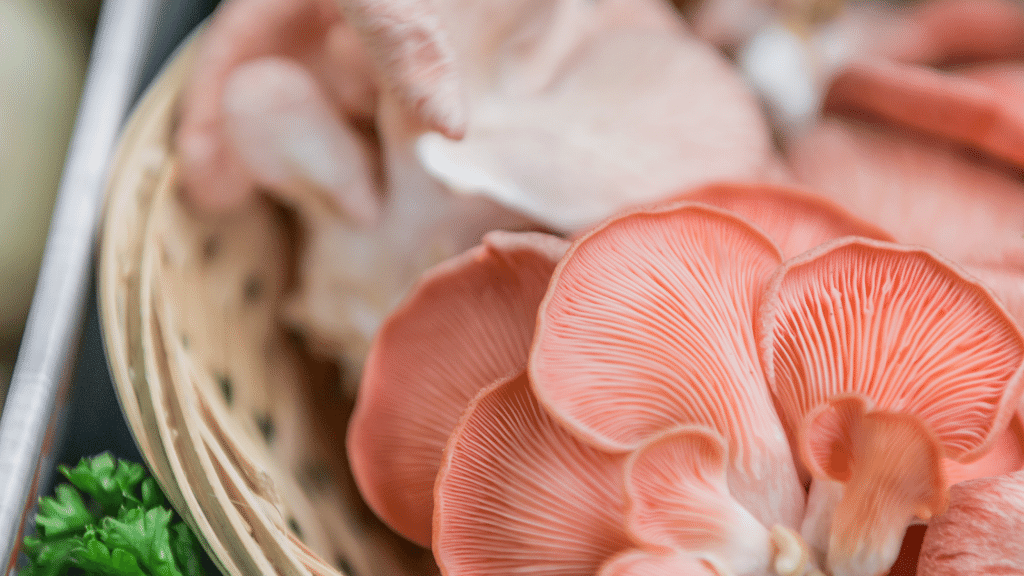
Oyster mushroom nutrition
Oyster mushrooms have been consumed for centuries and are packed with fiber, vitamins and minerals. They’re also low in calories and contain a range of micronutrients, which make them a great addition to almost any diet.
Here’s the nutritional content for 1 cup of oyster mushrooms:
- Calories: 28
- Carbs: 5 grams
- Protein: 3 grams
- Fat: <1 gram
- Fiber: 2 grams
- Niacin: 27% of the Daily Value (DV)
- Pantothenic acid (vitamin B5): 22% of the DV
- Folate: 8% of the DV
- Choline: 8% of the DV
- Potassium: 8% of the DV
- Iron: 6% of the DV
- Phosphorus: 8% of the DV
- Zinc: 6% of the DV
What are the health benefits of oyster mushrooms?
Oyster mushrooms aren’t just delicious. They’re also slowly being recognized as a mushroom with strong functional and medicinal value. However, the research on the benefits of oyster mushrooms is limited, but there have been some studies on their purported benefits that we’ll dive into below.
In general, oyster mushrooms are renowned for their high antioxidant value, their potential to lower blood pressure, and to provide natural immune support.
Let’s get a bird’s-eye view of all of the potential benefits:
1. High in antioxidants
One of the most fascinating health benefits of oyster mushrooms is their high antioxidant content. Antioxidants are important because they help protect our cells from damage caused by free radicals. Free radicals are unstable molecules that can cause cell damage, which can lead to disease.
Oyster mushrooms are a good source of two powerful antioxidants, ergothioneine and glutathione. Ergothioneine is a unique amino acid that helps protect cells from oxidative stress. Glutathione is another important antioxidant that helps boost the immune system and detoxify the body.
Oxidative stress has been linked to cancer, heart disease, stroke and immune deficiency, among other undesirable health outcomes.
By supplementing your diet with oyster mushrooms, you may be helping to offset the effects of free radicals with antioxidants.
2. Immune-support benefits
Oyster mushrooms are a great source of beta-glucans, which are polysaccharides that have been shown to support the immune system. Pleuran, specifically, is a type of beta-glucan delivered by oyster mushrooms. This type of fiber can support the body’s defense against infection.
In one 8 week study, beta-glucans from oyster mushrooms were shown to increase the activity of natural killer cells, which are a type of white blood cell that helps the body fight off infection.
And a 4-month study involving 90 people who had the herpes-simplex virus showed an extract of beta-glucans from oysters mushrooms was a promising treatment to the virus and that more research should be conducted to understand its potential in a larger study.
For more on beta-glucans, check out this blog.
3. May improve heart health
Did you know that oyster mushrooms are not only delicious, but they're also good for your heart? That's right - these little fungi can help reduce cholesterol and improve circulation.
Citing a handful of studies, the American Journal of Medicine outlined that consuming mushrooms can change some metabolic markers like LDL, HDL and triglycerides.
As discussed in their high quantity of antioxidants, oyster mushrooms have a compound called ergothioneine. We mentioned that it blocks harmful free radicals from attacking cells in the blood vessels, but it also helps keeps blood platelets from clumping together to form a clot, which is good for your heart health!
A study on rats detailed how oyster mushroom extract decreased oxidative stress in the kidneys, heart, and brain.
Check out our guide for more research on how mushrooms can contribute to better heart health.
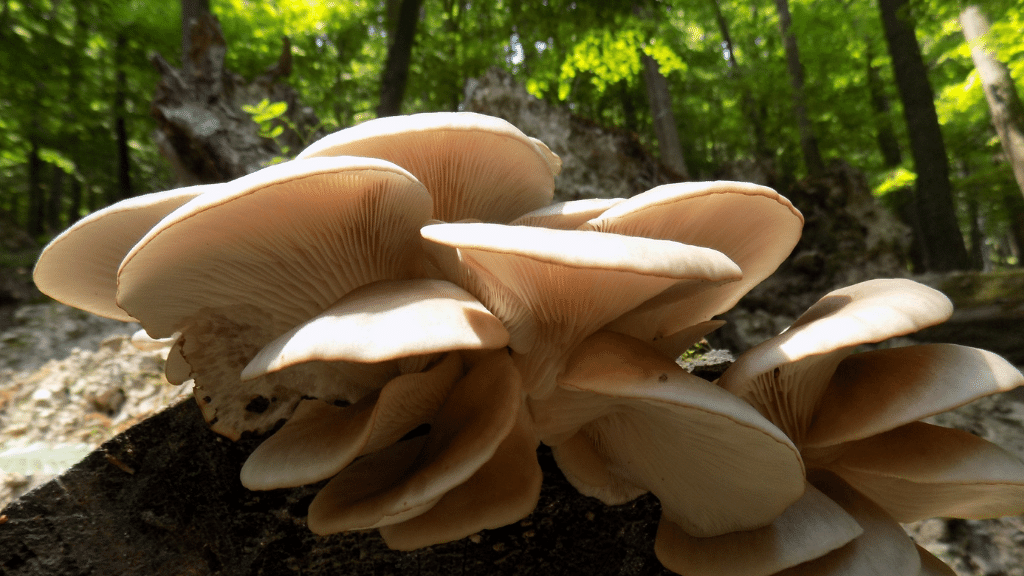
4. Can lower high blood pressure
The high antioxidant content of oyster mushrooms drives the majority of its potential health benefits. Antioxidants may prevent LDL cholesterol from being oxidized and clogging up your arteries; oyster mushrooms also have anti-inflammatory properties (like beta-glucans, which are a polysaccharide in the mushroom) to combat chronic inflammation, which can lead to heart disease.
They're a good source of potassium, which is an important mineral for regulating blood pressure.
Of the limited studies that are done, there is one that pooled together a list of trials and the effects of oyster mushroom intake. The findings weren’t conclusive, but stated, “intake may improve cardiometabolic health, but evidence for this is low.” We’ll be on the lookout for more studies on this!
5. Anti-cancer support & cancer treatment
Studies have shown that oyster mushrooms can help fight cancer. A study done on a variety of mushrooms found that Pleurotus was one that showed success. The study's authors believe that the extract works by causing the cancer cells to undergo apoptosis, or programmed cell death.
Another study on breast and colon cancer cells and the effects that oyster mushrooms have concluded that, “has potential therapeutic/preventive effects on breast and colon cancer.”
Studies done with mice in-vitro have shown that oyster mushrooms have anti-tumor properties. So far, not much research on humans has been done. The extract of oyster mushroom cells can interfere with the cancer cell cycle.
There was another study done on a water extract of oyster mushrooms as well which encouraged future use and exploration into its anti-tumor properties, especially due to their low cytotoxicity.
Looking for more? We put together a guide on how medicinal mushrooms can be used for cancer support.
6. May help to regulate cholesterol
Consuming oyster mushrooms may also help regulate blood sugar levels, in addition to helping the heart in other ways.
This is because they contain compounds that bind to bile acids, which helps promote healthy cholesterol levels. Additionally, oyster mushrooms are a good source of fiber, which also helps to promote heart health.
In a study of 22 people with type-2 diabetes, researchers found that after taking powdered oyster mushrooms, they reduced the blood sugar levels after their meals.
The beta-glucans found in the fiber of oyster mushrooms also slow down carbohydrate absorption and digestion, which could eventually lead to lowering blood pressure.
More research is needed to determine its full effects.
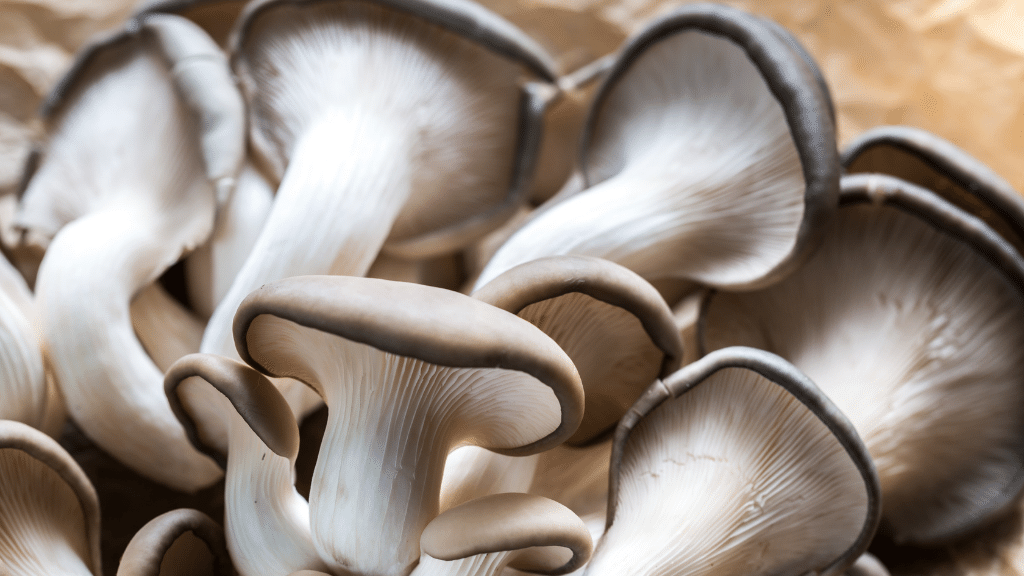
7. Anti-aging properties
If you haven’t seen the benefits of adding oyster mushrooms to your diet, maybe this will persuade you a bit!
After all, one thing we all agree on is that aging can be tough. We show signs of it regularly, from aches and pains to blemishes on our skin, like wrinkles, dark spots, and more.
Oyster mushrooms may help combat this because of compounds like ergothioneine and glutathione, which help to protect your cells from damage. This can help to prevent premature aging, both internally and externally.
The studies on this specifically are not there, but could be an additional benefit thanks to its nutritional properties and beneficial compounds.
Oyster mushrooms aren't the only mushrooms with powerful anti-aging properties. Check out this guide to using chaga for anti-aging here.
8. May protect the liver
The first known use of oyster mushrooms as a treatment for liver problems dates back to the Ming Dynasty in China. The Chinese have long considered these mushrooms to be a medicinal food and used them to treat a variety of ailments. As we’ve discussed, oyster mushrooms are rich in antioxidants and polysaccharides, which are thought to help protect the liver from damage. They also contain compounds that can help stimulate the production of new liver cells.
There is an interesting study done on taurine and oyster mushrooms and its effects on oxidative damage of the liver in mice caused by paraquat. Parquat is a toxic chemical that has been used in herbicides. There’s also been some hefty lawsuits around the chemical as well. The findings stated that while “paraquat causes oxidative damage to the liver, taurine and oyster mushrooms can prevent it.”
Important note on oyster mushroom studies
While these studies give us some information about some oyster mushroom benefits, they aren’t comprehensive. Many studies about the health benefits of oyster mushrooms are done in-vitro or on mice and other animals.
More research is needed in order for companies, products and mainstream medicine to support these benefits.
Remember to always consult your doctor before making any changes to your diet or adding any supplements.
It’s better to be safe when it comes to your health.
How much oyster mushroom should I take?
To reap the general health benefits of oyster mushrooms, eat one or two cooked fruiting bodies two to three times a week.
For those looking to benefit from cholesterol regulation, it’s recommended to consume about ½ to 1 teaspoon of dried tea extract.
Oyster mushrooms are incredibly easy to grow using boxed grow kits. In fact, they're one of the most popular varieties to grow at home because of how easy they are to cultivate. We love North Spore's grow kits for those looking for delicious (and healthy!) culinary mushrooms.
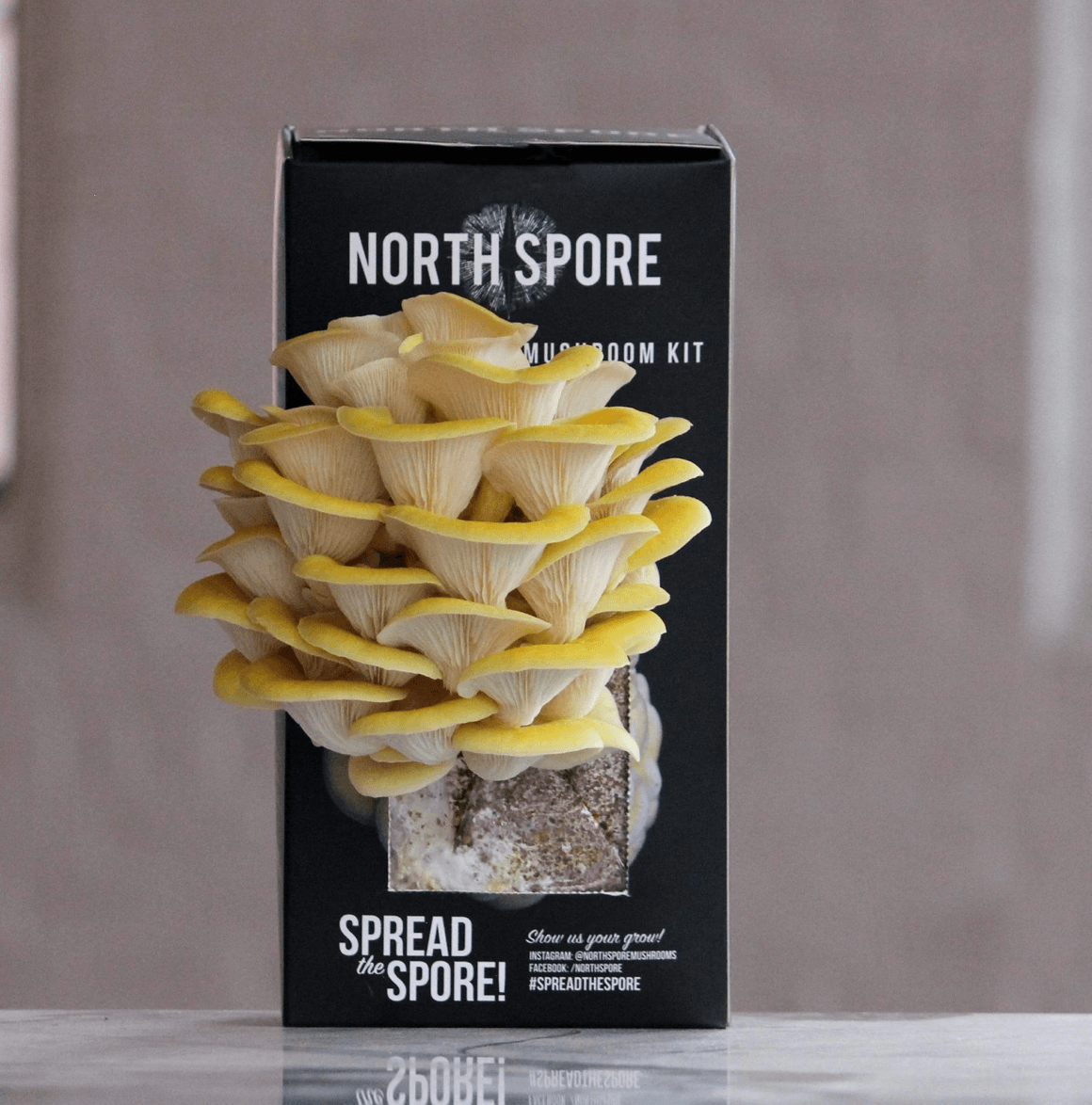
What are common ways to take oyster mushrooms as a supplement
There’s more than one way to reap the benefits of oyster mushrooms.
You’ll most likely find them used in culinary practice as a gourmet mushroom that can be added to a variety of dishes.
But, you’ll also find them as supplements that we’ll explore a bit below.
First, though, the easiest way to introduce oyster mushrooms into your diet is by cooking with them!
How to prepare & cook oyster mushrooms
As mentioned earlier, people around the world have centered oyster mushrooms in their dishes.
It’s common to add them to soups, pasta, sauces, gravy and sautéed on their own.
Just know that oyster mushrooms need to be heated at high temperatures to release their medical compounds mentioned above.
Here’s what to know when you’re planning to eat oyster mushrooms:
- Avoid soft or slimy mushrooms when buying from a store
- Store them in a paper bag
- Cut away the central stalk and the caps will fall away when prepping for cooking
- Rinse of the dirt or wipe away dirt with a wet paper towel, but make sure they don’t get water logged (this will take away their flavor)
- Roasting, stir frying or grilling brings out the best of its velvety texture
Then it’s up to you what recipes you use to bring out the oyster’s unique flavor profile.
When you're ready to start cooking, check out these recipes for oyster and other gourmet mushrooms.
What to look for in an oyster mushroom supplement
You’ll generally find oyster mushroom supplements in two different forms.
- A powdered extract available by powder (scoop) or by capsule
- A liquid extract (tincture)
Both are potent extracts and can deliver you the benefits of oyster mushrooms without cooking with them. Personal preference is the key indicator.
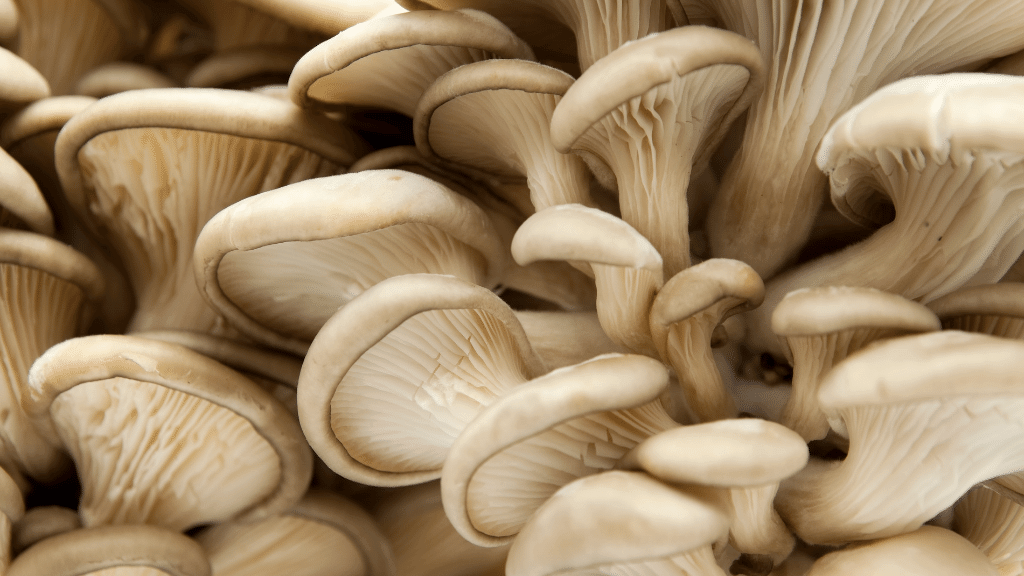
Taking powder by a scoop and adding it to a drink may have more of an earthy taste. If that isn’t up your alley, try a capsule which is the same product, but in an easy-to-swallow form.
Tinctures, or liquid extracts, have a high bioavailability, but some may not appeal to the bitter taste of the alcohol that is used in the extraction process.
Here are a few things to keep in mind when shopping for an oyster mushroom supplement:
- Always look for products with published COAs (certificate of analysis) -COAs make sure products such as supplements are being manufactured to the customers expectations.
- Most supplements aren’t tested for the prevention and/or treatment of the conditions that they advertise.
- The supplement industry isn’t regulated in the same way the pharmaceutical industry is.
- Read user reviews -User reviews give you a sense of the effectiveness of a supplement and if it actually produces the effects that the supplements promises.
- Look for a hot water extracted product - this extraction is critical to break down the cell walls of fungi, assisting in getting to the active compound, beta-glucans, and making it easy to absorb for our bodies.
Hot water extracts do exactly what it sounds like. Think of a large hot-tea production. The oyster mushrooms are put in large vats of hot water to extract the beneficial compounds and then the resulting liquid is typically spray-dried or freeze-dried into a powder. Many people choose to add powdered extract to their morning coffee.
Look for the fruiting body- The fruiting body is a full-mature product, fruiting bodies have had more studies done on them, so their benefits are more or less identified.
For this reason, look for 100% fruiting body when shopping for oyster mushroom supplements.
When you're ready to try at-home extraction, we've got the guide for you.
What are the side effects of oyster mushrooms?
Before you head to the store or your trusted online retailer, don’t forget about some of the following side effects.
Some people can be allergic to mushrooms and other fungi. Learn the symptoms of food allergies, such as hives, swelling and nausea before trying a different species. If you notice these symptoms, get medical attention right away.
Oyster mushrooms contain aribitol, a type of sugar alcohol that can cause gastrointestinal symptoms.
Mushrooms also contain a fair amount of purines, which gets broken down as uric acid. Elevated levels of this acid can cause gout-like symptoms and aggravate gout.
No part of the real oyster mushroom is poisonous, but there are some poisonous species that look like oysters.
If you plan to forage wild mushrooms, be very careful in identifying the different species and know which ones are look-alikes. Here's a great guide on three of the most dangerous oyster mushroom look-alikes including:
- Jack-O-Lantern (Omphalotus Olearius)
- Ivory Funnel Mushrooms (Clitocybe Dealbata)
- Ghost Fungus (Omphalotus Nidiformis)
Final thoughts on oyster mushrooms
Oyster mushrooms are a delicious way to add a ton of nutritional and medicinal value to your diet, whether it be by cooking them or taking them as a supplement.
While we don’t have an abundance of research on them yet, there is enough to showcase their potential to better your health across the board. For that, we love them, and hope you’ll find the best way to incorporate them into your diet!
Have questions about oyster mushrooms or anything else in the world of fungi? Email us at hello@remeday.com and we’ll be happy to answer any questions!

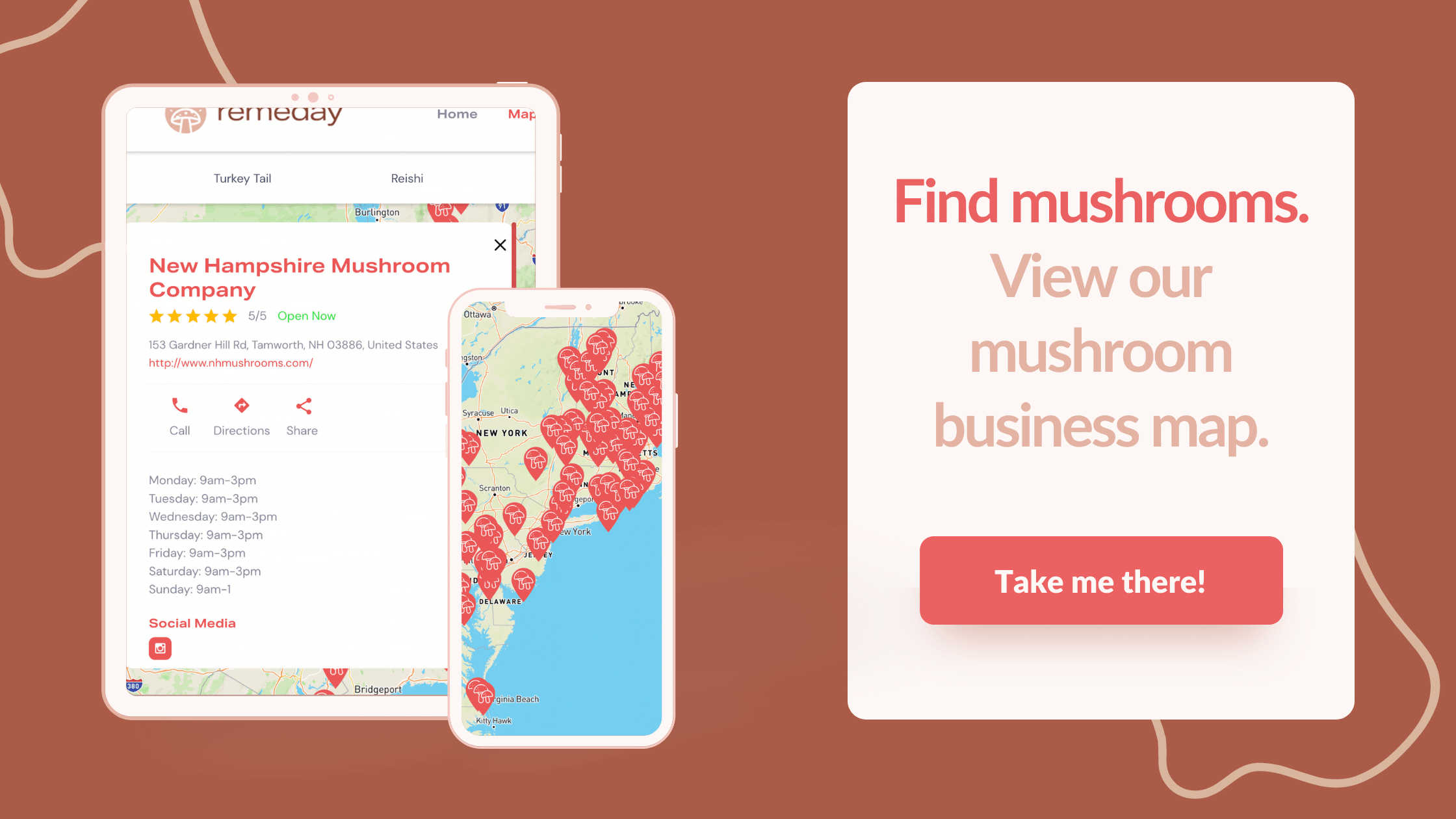
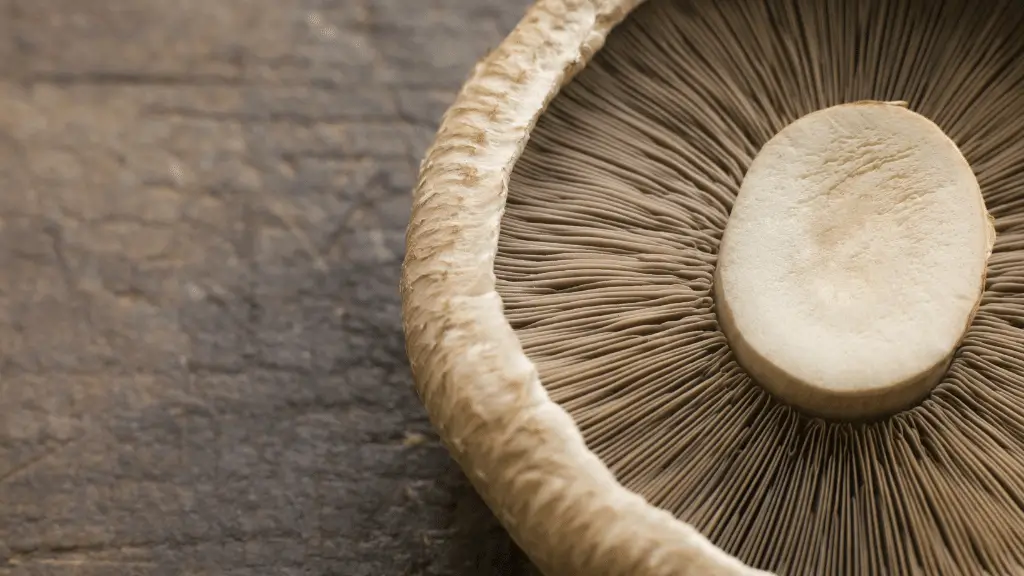
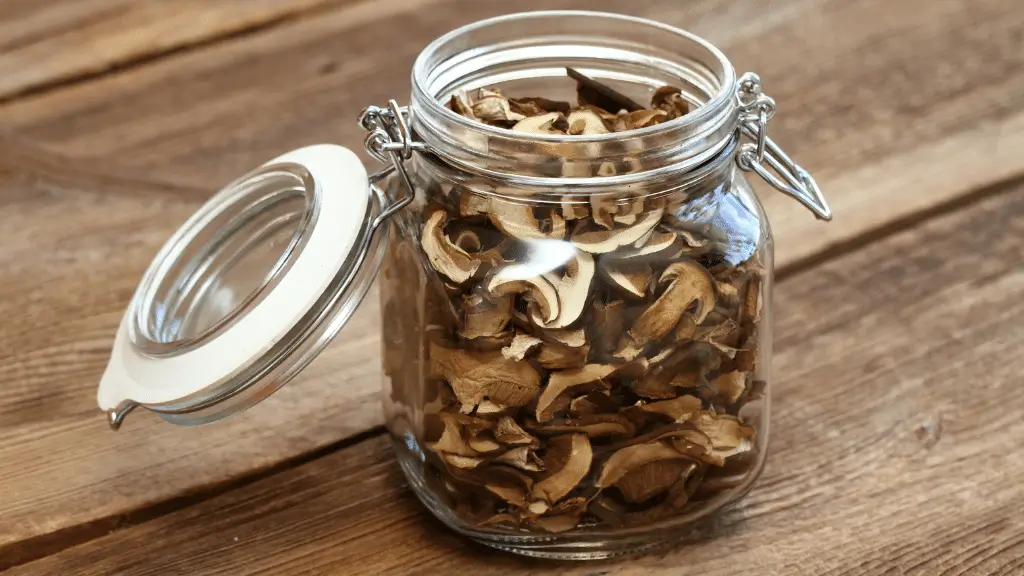


.png)
